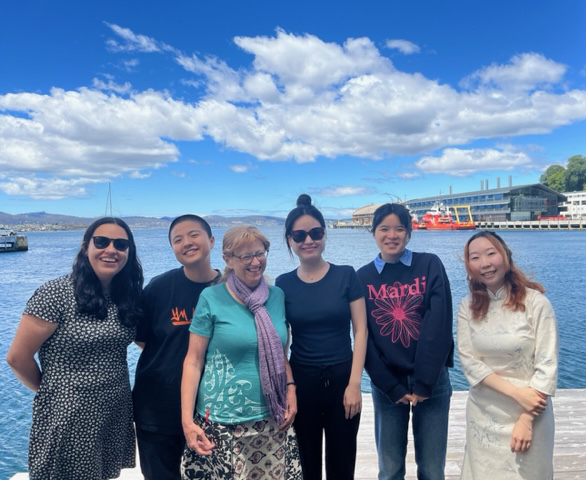
ACAP Executive Secretary, Dr Christine Bogle, with the five translation students on an outing in Hobart during their week-long internship program
(L-R) Angelica Maria Baquero Manrique, Ying Dong, Christine Bogle, Luna (Hyunkyung) Kim, Seah Yim and Linda (Qiyue) Jian
The ACAP Secretariat was once again delighted to welcome translation students to its annual internship programme in early January this year. Five translation students from Australian universities spent a week at ACAP Headquarters in Hobart putting their translation skills to the test.
ACAP normally hosts students completing their Master’s in one of ACAP’s three official languages - English, French and Spanish. However, in a first for the Agreement, this year the Secretariat hosted non-ACAP language students, with four of the five students specialising in Korean and Mandarin translation. This year’s cohort were: Ying Dong and Linda (Qiyue) Jian who specialise in Mandarin and English translation, Seah Yim and Luna (Hyunkyung) Kim in Korean and English, and Angelica Maria Baquero Manrique in Spanish and English.
The students spent the week carefully translating technical reports, and web pages into the three languages, with the Secretariat quick to capitalise on the opportunity to have the Agreement’s Best Practice Advice on seabird bycatch mitigation measures translated into Mandarin (simplified) and Korean. To have the advice available in Mandarin and Korean is a positive step in ACAP’s ability to raise awareness of the mitigation measures in two countries with significant fishing fleets.
Linda Jian is studying for her Master of Translation and Interpreting at the University of NSW, specialising in Mandarin and English translation. Her interest in pursuing a Master’s came from a desire to gain a deeper understanding of language, especially the nuances in the word choice, and what is unsaid (pacing, pauses, tone and body language etc.). When asked what she enjoys about translation she said: “The opportunity and time to pore over the sentences and curate word choices in another language.”
Cultivating understanding between people and cultures was a common theme between the students when asked about their interest in the profession. Angelica Maria Baquero Manrique is a student in the Master of Translation and Interpreting Studies program at Macquarie University, and her focus is Spanish and English translation. Angela’s interest in obtaining a Masters came from her years of experience working in the field. She said: “Translation, for me, is not just a profession, it's a rewarding journey that involves helping individuals convey their knowledge to a broader audience. I find great satisfaction in facilitating the transfer of information between languages and cultures. It's a way to bridge gaps and foster understanding,”.
Reflecting on the week, Dr. Christine Bogle, ACAP's Executive Secretary, emphasised the immense value the students bring to ACAP through the internship programme, stating: "The assistance from the students is truly invaluable for ACAP, especially this year as ACAP’s Best Practice Advice for seabird bycatch mitigation was translated into Mandarin and Korean. Hosting the students is always a delight, and we are grateful for their contributions year after year."
12 February 2024

 Español
Español  English
English  Français
Français